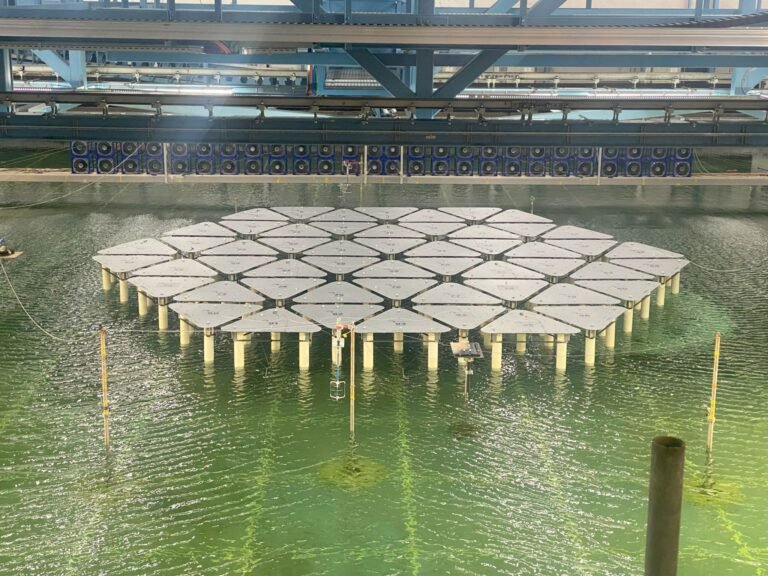SolarDuck Completes Successful Test Campaign at MARIN with Interconnected Offshore Floating Solar Platforms
Dutch-Norwegian firm SolarDuck has recently completed an innovative test campaign at the Maritime Research Institute Netherlands (MARIN), showcasing the capabilities of their offshore floating solar platforms. The campaign involved 54 interconnected platforms, with a combined real-world capacity of approximately 6 MWp (megawatt peak).
This marks SolarDuck’s third test round at the MARIN offshore basin, demonstrating the company’s commitment to pushing the boundaries of sustainable energy solutions.
“We started two years ago with a single triangular platform, scaled up to six in the HEX-1 layout, and now to 54 platforms in the HEX-3 configuration,” shared SolarDuck in a social media post, highlighting the evolution of their design and testing process.
The project involved scaling down SolarDuck’s full-scale design to a 1:20 model, utilizing carbon tubes and lightweight connectors to replicate mechanical behavior accurately.
According to SolarDuck, the test focused on the dynamic response of multi-body systems, examining coupling forces, mooring loads, and the impact of wind, currents, and waves on the interconnected platforms.
One significant observation made during the campaign was the damping effect of wind across the array, with wind visibly reducing platform motion as it passed over the system.
“Wind has a clear damping effect on the platforms, which was evident in both single platform tests and across the full 54-platform array. This insight will be valuable as we continue to optimize our designs for real-world applications,” noted SolarDuck.
The campaign also included decay testing of single platforms, essential for future deployments in remote locations. SolarDuck praised MARIN’s motion tracking system for its support in conducting the research effectively.
MARIN’s Offshore Basin: A Hub for Innovation
MARIN’s Offshore Basin serves as a crucial facility for simulating and testing the behavior of offshore structures in various environmental conditions. The basin, measuring 45 x 36 x 10.2 meters, is equipped to test structures in waves, wind, and current, providing valuable insights for companies like SolarDuck.
In January, SolarDuck conducted tests for its updated floating solar platform design at MARIN as part of the DEI+ Merganser project consortium, showcasing the ongoing collaboration between industry and research institutions in advancing renewable energy technologies.
With successful test campaigns like the one at MARIN, SolarDuck continues to demonstrate its leadership in the field of offshore floating solar platforms, paving the way for sustainable energy solutions in the maritime industry.

